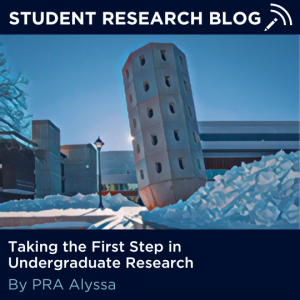By Alyssa Daniels, Peer Research Ambassador
 Are you an undergraduate student who wants to get started in research at UConn, but you aren’t sure how to take the first step? I know when I got to UConn, I was surrounded by students doing amazing research. I knew there were incredible opportunities on campus, but I didn’t know how to find them! It can be so frustrating figuring out how to take the first step! Here are some tips and tricks on how to get started:
Are you an undergraduate student who wants to get started in research at UConn, but you aren’t sure how to take the first step? I know when I got to UConn, I was surrounded by students doing amazing research. I knew there were incredible opportunities on campus, but I didn’t know how to find them! It can be so frustrating figuring out how to take the first step! Here are some tips and tricks on how to get started:
Faculty Bios on Department Websites
This is a pretty straightforward way to get started on your research journey! All you have to do is google your department of interest (e.g., Psychology) and “UConn.” Then go to “people,” then “faculty directory.” Boom! You have a whole list of names, faces, and their current/previous work right at your fingertips. I highly recommend exploring these department pages as this is a wonderful way to get to know the faculty here at UConn in your subject area of interest. Read their bios and get familiar with their work. I’d even recommend googling them to learn more about the research they do! Then, make a list of whose work interests you. The faculty members will almost always have an email address listed. I recommend reaching out! Check out our “email etiquette” section on the Office of Undergraduate Research website for recommendations when emailing faculty.
Lincus
Lincus is a fantastic tool that I think is underutilized by students! It is a way to search for faculty members doing research in your area of interest. The benefit of using Lincus is that you can search by keyword to find faculty researchers across all departments and campuses. This is incredibly helpful as it prevents you from limiting your search to one department. For example, you can type “anxiety” into the Lincus search bar and get faculty across various departments such as Psychological Sciences, Physiology & Neurobiology, Nursing, and more! Once you type a keyword into Lincus, I would recommend clicking on faculty names and scrolling down to see their recent publications. Once you identify faculty members whose work looks interesting, I would advise you to obtain their email addresses on their UConn department profile page.
Daily Digest – Upcoming Events
I highly recommend attending research-related events happening across campus. During my first semester at UConn, I attended an Ecology and Evolutionary Biology fall semester “opening” event that was advertised in the Daily Digest. I got to talk to professors and graduate students in this department and learn about their work! Ultimately, I didn’t end up pursuing research in this field, but it was beneficial to make connections!
I also attended a Physiology & Neurobiology (PNB) poster symposium where graduate students were presenting their work. This also gave me the opportunity to speak with professors and graduate students in the PNB department. I got to learn more about their work and make valuable connections. This is where I met the first Principal Investigator I ever worked for!
I want to emphasize that it is okay to speak with professors in person. You don’t need to write an email to talk to them. They want to talk to you! Many professors want to work with students who are willing to take the extra step and talk to them about their work because it shows interest. Don’t be intimidated by their Ph.D. title. Every professor I have spoken with regarding research has been excited to talk about their work and meet a student who was interested!
Go to Office Hours
Again, talk to your professors! Get to know them! Even if they aren’t doing research that interests you, or aren’t looking for students to assist in their work, it is so helpful to make connections with faculty and know your professors more personally. (Plus it can also make those 300+ person classes feel a lot less intimidating!) I just want to remind you that office hours are not only for exam/course material-related questions – professors are willing to talk to you! This is also a really great way to network as professors may have colleagues pursuing research that may interest you, or have open spots in their labs for undergraduates.
Conclusion
Getting started in research as an undergraduate can feel overwhelming and intimidating, but there are resources to help you get involved! Faculty bio pages, Lincus, events advertised in places like the Daily Digest, and Office Hours are all fantastic places to start! Additionally, The Office of Undergraduate Research is here to help you. There are 12 Peer Research Ambassadors who are students at UConn just like you who have gone through this process and are here to support your research endeavors. The Office of Undergraduate Research also runs workshops such as “Getting Started in Undergraduate Research.” You can check out upcoming workshops on our website.
Remember that you’ve got this! Getting that first research opportunity can be daunting but don’t give up!
Alyssa is a senior majoring in Physiology & Neurobiology and minoring in Molecular & Cell Biology and Psychological Sciences. Click here to learn more about Alyssa.